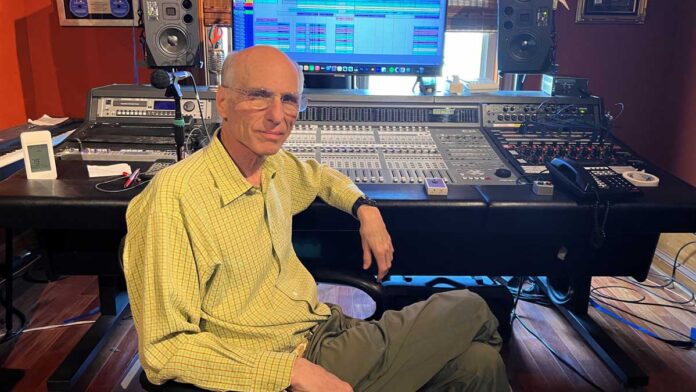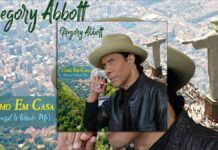The legendary Owner of Resonance Records brings ‘Heart of Brasil’ to Our streaming station this July.
Producer George Klabin To Host ‘Heart Of Brasil’, a radio show focused on Brazil’s most dynamic and creative period with his own unique and rare recordings.
Connect Brazil is proud to partner with Grammy-winning label owner George Klabin on an exciting new weekly radio show for our live streaming station beginning this July.
Unique for Brazilian radio, George Klabin’s Heart of Brasil will feature rare and unreleased recordings of Bossa Nova and Brazilian Jazz from Brazilian music’s most dynamic and creative period, the early 60s through the 70s.
Klabin, who speaks fluent Portuguese and grew up spending his summers in Brazil during those years, brings his passion, respect, and amazing storytelling to the songs, albums and artists featured during every 90-minute show.
Klabin’s label, Resonance Records is the centerpiece of his Rising Jazz Stars Foundation, a non–profit organization dedicated to preserving the art and legacy of jazz.
Recently, George Klabin’s projects include the Grammy-nominated My Heart Speaks, Ivan Lins’ first album under his own name since 2014, and featuring special guests Dianne Reeves, Tawanda, Jane Monheit, and Randy Brecker.
Simply put, George Klabin is an American Brazilian treasure, and he’s ready to share his love of Brazil with you, on Heart of Brasil!
So, I sat down with him to talk about life, music, and stories that could only happen in a recording studio. Let’s meet George Klabin.
Scott Adams, Creative Director at Connect Brazil
Producer George Klabin To Host ‘Heart Of Brasil’
Tell me about your love of Brazilian music and how it began.
Well, I was five when I began to spend my USA summers in Sao Paulo with my father. It was 1951 and he had recently purchased the latest record player for the new long-playing records (LPs). So he gave me a pile of 78 rpm records and his old wind up Victrola. I was fascinated and soon learned to use it to listen to those 78’s which included some Brasilian music of that period. I listened to Brasilian music on TV, radio and on my Dad’s LP system.
It was 1961 and was 15 when I discovered Pedrinho Mattar, the popular Brasilian pianist who played jazz and Brasilian tunes on TV. I was actually able to meet him at his home. And I was introduced to a friend of my Dad who was a collector of LPs. He was wealthy enough to purchase most of the imported popular LPs that were released in all styles of music, and he had a giant collection in a special listening room in his home. He also had a nice grand piano.
I had gotten a small Grundig reel to reel tape recorder and asked him for permission to record Pedrinho Mattar, and he agreed. That was my first foray into recording music.
Exploring the record store
Back then, I liked visiting Bruno Blois, a very popular large record store in the central part of Sao Paulo. I’d hang out there for hours because they had a huge selection of records for sale. And because I purchased a good number of them every time I came, they allowed me to play the LPs in a booth with earphones, as much as I wanted.
That was wonderful! I loved jazz, and I searched for any Brasilian artists who played jazz, which led me right to Bossa Nova. So, I would go to that store several times every summer, throughout the 1960’s. I started to buy many of the bossa nova records, and because I could check them out in the store, I quickly became familiar with the style.
I still have all the LPs I bought at that time, and you’re sure to hear them during my new radio show at Connect Brazil. The 60’s was a great time for Bossa Nova and I heard so many of the seminal and influential musicians from that time, as it was happening.
Was that what sparked the idea of a career in music?
I was born in New York and at 18 I attended Columbia University as a freshman. My love of jazz led to hosting a weekly jazz radio show on WKCR-FM, Columbia’s Stereo radio station. It was called Jazz Til Midnight, and you’d hear me every Sunday from 9 PM to Midnight.
I hosted and selected the music from the radio station’s library as well as my own large collection.
I also wanted to be able to play jazz recordings that could only be heard on my show, not on any released record. So I purchased portable professional tape recording equipment including a Crown recorder, German microphones, an Ampex mixer, and earphones. I was able to record very high quality stereo tapes with the permission of the musicians. Many of the best jazz musicians of that period were happy to allow me to record them, and they got a free copy as I was only playing it once on the air.
Engineering his future
After a while I got a reputation as a good engineer for recording concerts and club venues. So I had a side business where I could charge a fee to record. I used a wonderful stage venue in the Wollman Auditorium at Columbia which I was able to secure on Sunday afternoons, and which had a gorgeous 9-foot Steinway concert grand (always tuned).
Eventually I recorded live jazz for record labels as well for the artists. In addition, some of my recordings turned out to be important historical documents, such as the Bill Evans Trio recorded live at the Top of the Gate Club in 1968, Les MCann live in 1967,or the first night in 1966 that the Thad Jones Mel Lewis band played at the Village Vanguard. Those recordings, and some others of the same period, eventually were released (decades later) on my Resonance records label.
So, recording became my passion. After graduation in 1969, I opened a recording studio in Manhattan called Sound Ideas, which I ran for 12 years. In 1973 we took over the Capitol Records Studio on West 46th Street to join the ranks of New York’s top studios. Among our many memorable recordings were five James Brown albums over about a 10-year period, and the huge disco hit ‘A Fifth of Beethoven’.
What can listeners expect when they tune in to your new weekly radio show, Heart of Brasil this July?
Glad you asked! The music I’ll play is from my personal collection including many records no longer available. I’ll also include recordings I have made which have not been released officially. Heart of Brasil will focus on the authentic Brasilian Bossa Nova and Bossa/Jazz recordings mainly from the 60’s and 70’s with some overlap into the 80s and 90’s.
And you’ll hear my stories about the song and musicians I play. Just like we’re talking right now. If you’re a Bossa Nova and Brazilian jazz fan, I think you’ll enjoy Heart of Brasil on Connect Brazil’s streaming station, beginning this July.
Why did you decide to take on such an important project?
It’s about time. My unique background and my access to these important seminal recordings needs to be shared and preserved.
And as music today becomes less and less authentic and melodic, I think it’s important to reintroduce this positive, enjoyable style of music which many younger people may not really be aware of. Listening to good Brasilian Bossa Nova and its unique bossa beat, its lovely melodies and wonderful rhythms, creates a relaxed and positive feeling.
After all, the world loves Bossa Nova and I’m excited to partner with Connect Brazil to carry this music forward.
As a recording engineer, producer, and founder of a Grammy-winning record label you have a treasure trove of rare, unreleased, and one-of-kind recordings. Which are some of your most cherished Brazilian jazz recordings?
Let me mention one that’s been released. My favorite record of music of any style is Milton Nascimento’s Courage on A&M. This was his first release and to this day it remains a seminal example of great melodic composition.
Courage transcends any style, with totally original melodies never heard before. The late 60’s was a fertile time for all music, especially in Brasil. Composers like Ivan Lins, Djavan, and others came along. Unlike many musical fads that rose and fell in subsequent decades, good Brasilian music from this fertile period remains beautiful, exciting, rhythmically inviting, and even spiritual.
The lyrics are positive and philosophical. It was a gentler time, and the music reflects it. I cherish all the early recordings from Jobim, Lins, Djavan, Nascimento, and others. In many cases the best period in an artist’s career is before he or she gets too busy with their success. They risk losing the time to be reflective. Then their music can suffer.
Producer George Klabin To Host ‘Heart Of Brasil’
Tell me a good story from your years with Brazilian music.
One of the strangest and somewhat comical stories was in the late 70’s at my recording studio. I had a client, Joe Fields, who was releasing jazz records under his MUSE label. He called me one day and asked me to meet the well-known Brasilian composer Joao Donato who was in New York and had signed a recording contract with Muse for an album release of his original songs.
So, Donato comes over to the studio. He told me he had written six new songs. Joe Fields asked me to produce the CD since I spoke fluent Portuguese and Donato spoke almost no English. So I set up a Fender Rhodes electric keyboard for him to play the songs. He proceeded to record each one on keyboard. The problem was that there was no real melody. It was just a series of chords played in a rhythm with a few shards of melody that might be just a few notes.
After he finished recording the six “tunes”, Donato told me that they were not completed, and they needed a melody.
So he left.
About a week later I received a frantic call from Fields. He said that Donato was gone! He had left for Brasil without a word! And he also told me that he had paid Donato in full for the contract to write these songs, and Donato was not returning his calls!
He asked me what I could do.
The genius of Deodato
I was good friends with Eumir Deodato who lived in Manhattan. He’s the wonderful Brasilian composer/arranger who actually did the string arrangements for Milton Nascimento’s Courage album that I referred to previously.
So, Deodato came over. I played those 6 “tunes” for him and explained what happened with Donato.
To make a long story short, Deodato was able to extract melodies out of each song, by adding his own melodic ideas, write arrangements for a small rhythm group, and he and I produced recorded and mixed the final LP, with a great group of studio jazz musicians, and it was released on Muse as Donato/Deodato.
It even made the Billboard top 200 chart!
George Klabin’s new weekly show, ‘Heart of Brasil’ debuts this July on Connect Brazil’s streaming station. Please contact us for syndication opportunities.
Music, Travel, Friends, And Fun!
Producer George Klabin To Host ‘Heart Of Brasil’
Stories like Producer George Klabin To Host ‘Heart Of Brasil’ are what we do. Why don’t you join us?
Sign Up for our e-letter. Listen to our live streaming station, Brazil Back2Back, and our collection of streaming channels. Browse our Lifestyle Directory. Like us on Facebook, follow us on X, and find Brazilian events coast to coast.









